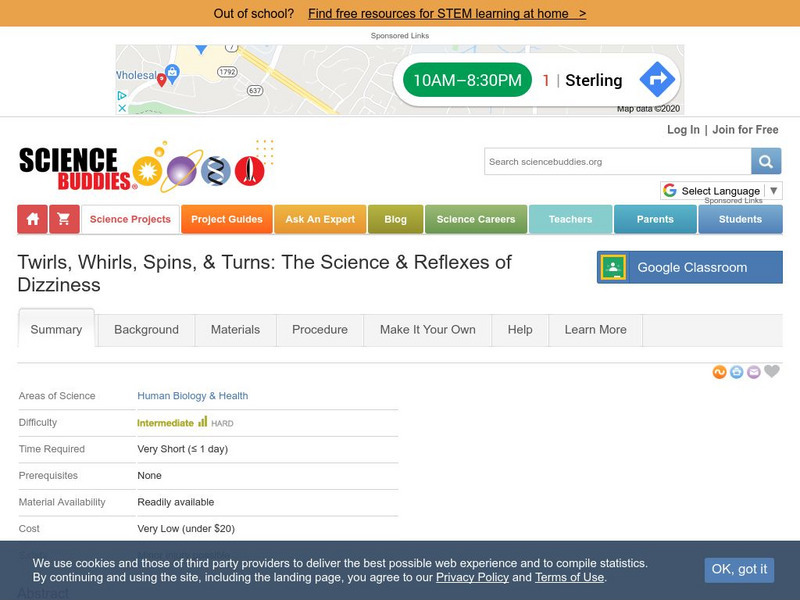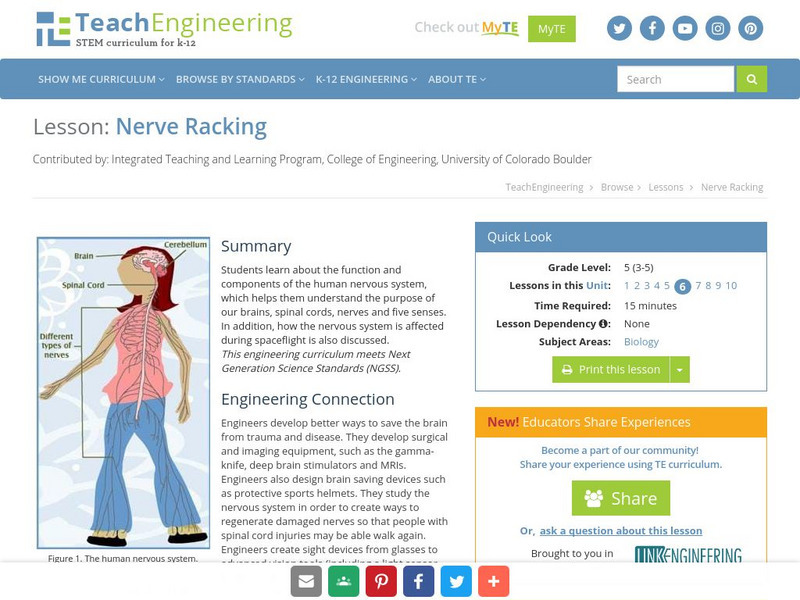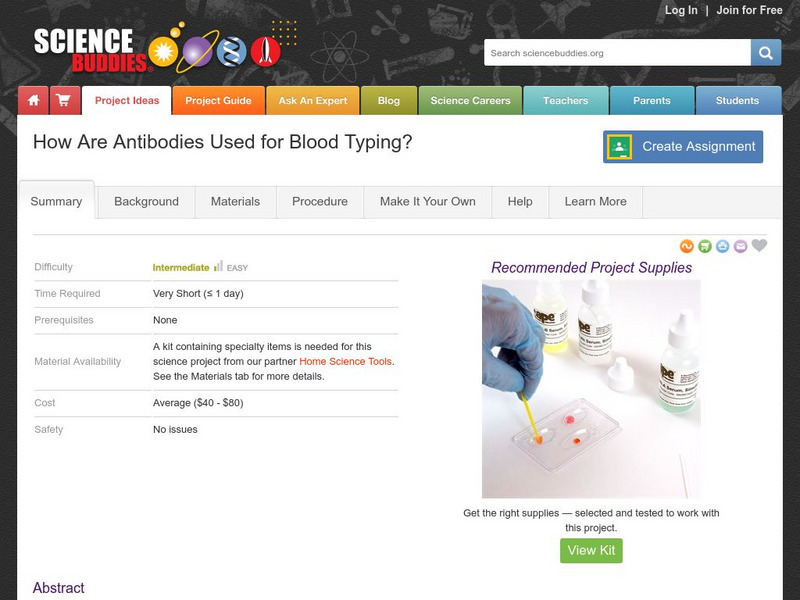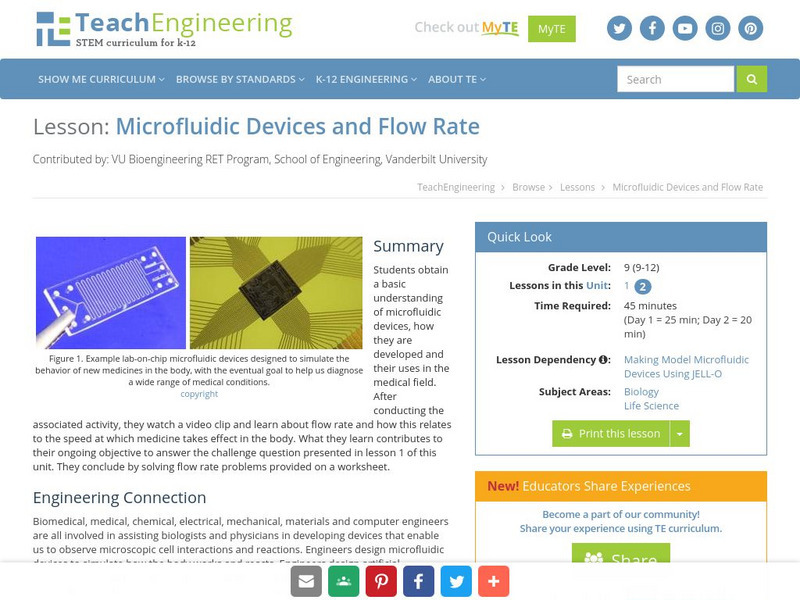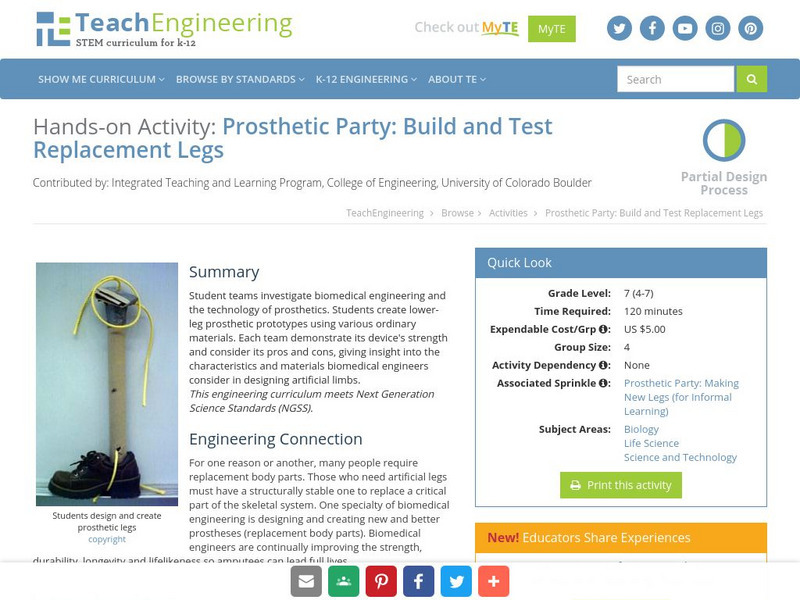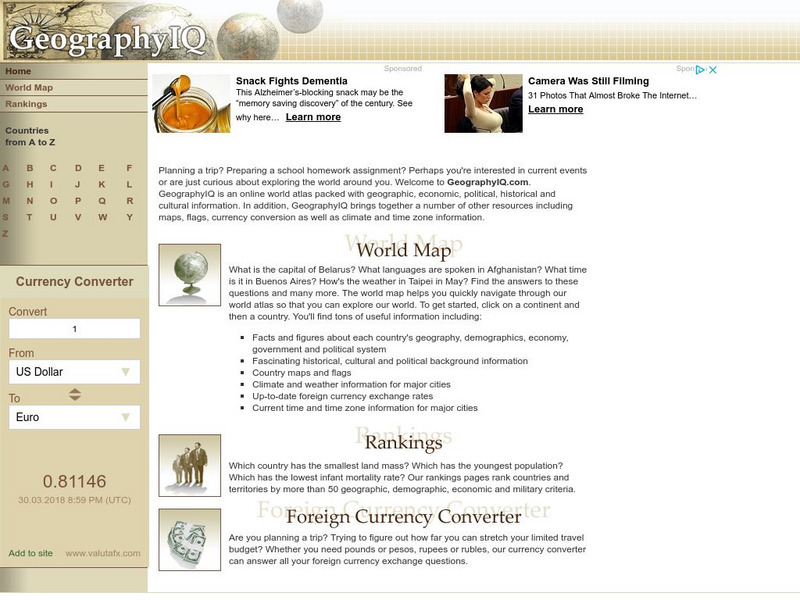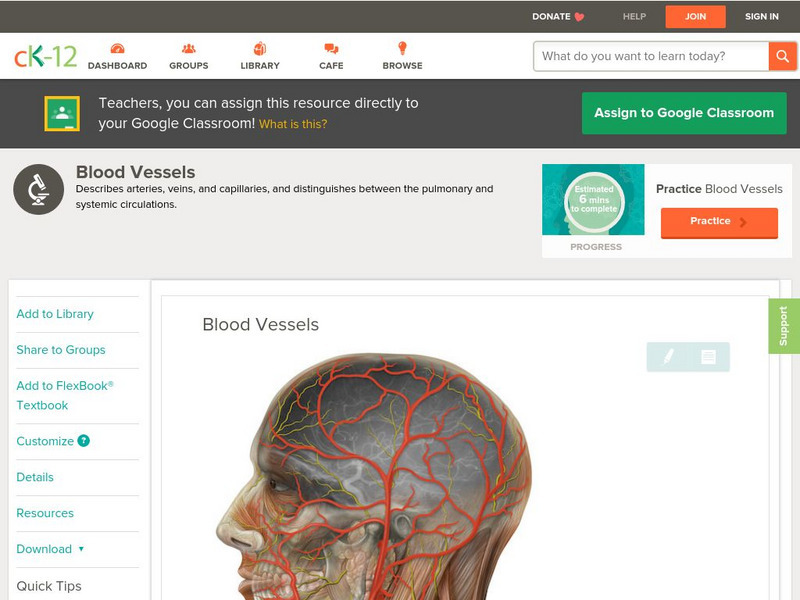Hi, what do you want to do?
Science Buddies
Science Buddies: Twirls, Whirls, Spins, & Turns: Reflexes & Dizziness
Tilt-A-Whirls, Merry-Go-Rounds, Spinning Tea Cups. Just the thought of these rides is enough to make someone dizzy, or queasy. Learn about spins, turns, and the mixed signals that fire in our brains when the sensation of dizziness takes...
Other
Respiratory System: How Lungs Work
How do the body's lungs work? Get a brief overview of how our lungs do their job. The explanations are accompanied by diagrams.
Soft Schools
Soft Schools: Skin Cross Section Game
An interactive labeling exercise helps students practice naming parts of the largest organ in the human body, the skin.
TeachEngineering
Teach Engineering: Nerve Racking
This lesson describes the function and components of the human nervous system. It helps students understand the purpose of our brain, spinal cord, nerves and the five senses. How the nervous system is affected during spaceflight is also...
CK-12 Foundation
Ck 12: Life Science: 11.41 Nerve Impulse
Understand the structure and function of a nerve cell, and how messages are transmitted throughout the human body.
TeachEngineering
Teach Engineering: Fascinating Friction!
In this activity, students use wood, wax paper and oil to investigate the importance of lubrication between materials and to understand the concept of friction. Using wax paper and oil placed between pieces of wood, the function of...
Gateway Community College
James Crimando: Major Superficial Muscles: Posterior Trunk and Arm
Learn the anatomy of the posterior trunk and arm.
Gateway Community College
James Crimando:major Superficial Muscles: Anterior Thigh and Leg
Learn the anatomy of the anterior thigh and leg.
Gateway Community College
James Crimando: Major Superficial Muscles: Posterior Shoulder and Upper Arm
Learn the anatomy of the posterior shoulder and upper arm.
Gateway Community College
James Crimando: Major Superficial Muscles: Posterior Forearm
Learn the anatomy of the posterior forearm.
Gateway Community College
James Crimando: Major Superficial Muscles: Anterior Forearm
Learn the anatomy of the anterior forearm.
Countries and Their Cultures
Countries and Their Cultures: Mangbetu
The Mangbetu live in the northeastern corner of Zaire. They are the founders of one of the few centralized political systems in Central Africa. The Mangbetu achieved a very high level of technological and material development, as...
TeachEngineering
Teach Engineering: Are We Like Robots?
Students explore the similarities between how humans move and walk and how robots move, so they come to see the human body as a system from an engineering point-of-view. Movement results from decision making (deciding to walk and move)...
Science Buddies
Science Buddies: How Are Antibodies Used for Blood Typing?
The human immune system has various ways of responding to an infection caused by bacteria or viruses. Our bodies produce proteins (antibodies) that are highly specific for the infectious agent as a part of our "humoral" immune response....
TeachEngineering
Teach Engineering: Muscles, Oh My!
Students are introduced to how engineering closely relates to the field of biomechanics and how the muscular system produces human movement. They learn the importance of the muscular system in our daily lives, why it is important to be...
Other
Marine Biological Laboratory: Why Study Marine Organisms for Biomedical Research
Descriptions of various research projects using marine organisms that have direct impact on medical research. The resource has a perspective on how medicine makes progress.
CK-12 Foundation
Ck 12: Life Science: 11.8 Joints
Understand the structure and function of different types of joints in the human body.
TeachEngineering
Teach Engineering: Microfluidic Devices and Flow Rate
Learners obtain a basic understanding of microfluidic devices, how they are developed and their uses in the medical field. After conducting the associated activity, they watch a video clip and learn about flow rate and how this relates...
TeachEngineering
Teach Engineering: Prosthetic Party
Student teams investigate biomedical engineering and the technology of prosthetics. Students create a model prosthetic lower leg using various materials. Each team demonstrate its prosthesis' strength and consider its pros and cons,...
Geographyiq
Geography Iq
Detailed geographical information on any country is available at this site. Within the World Map section, you can get facts and figures about each country's geography, demographics, government, political system, flags, historical and...
TeachEngineering
Teach Engineering: Our Amazing Skeleton
This lesson covers the topic of human bones and joints. Students learn about the skeleton, the number of and types of bones in the body, and how outer space affects astronauts' bones. Students also learn how to take care of their bones...
CK-12 Foundation
Ck 12: Life Science: Blood Vessels
[Free Registration/Login may be required to access all resource tools.] The blood vessels are an important part of the cardiovascular system. They connect the heart to every cell in the body. Arteries carry blood away from the heart,...
Alabama Learning Exchange
Alex: New Town Health Club
Over the course of the year, the learners in Human Anatomy and Physiology will design a health club. As part of this year-long project, the students will develop a brochure or print advertisement for the health club. This project will...
Hofstra University
Hofstra Univ: Why Was Bubonic Plague So Devastating to European Society? [Pdf]
The Bubonic Plague or "Black Death" came out of the eastern Mediterranean along shipping routes, reaching Italy in the spring of 1348. By the time the epidemic was abating in 1351, between 25% and 50% of Europe's population had died. The...





